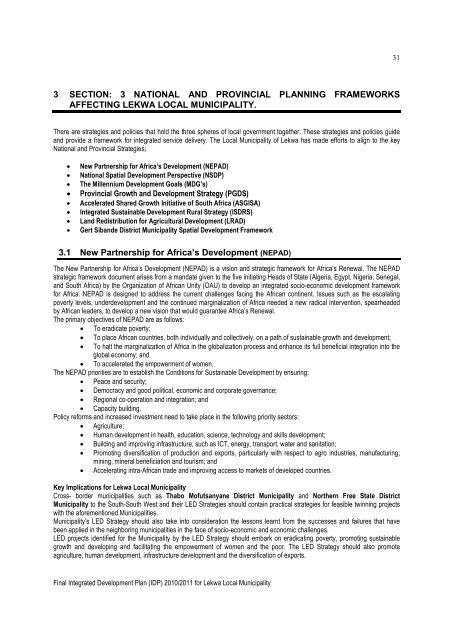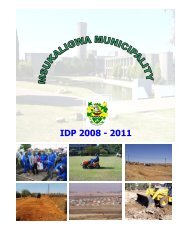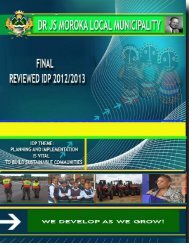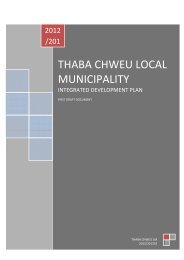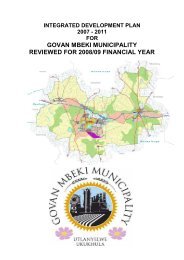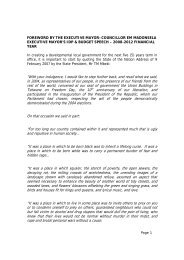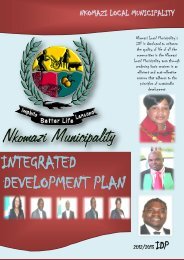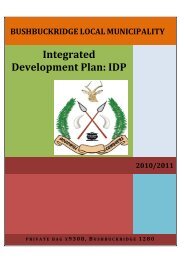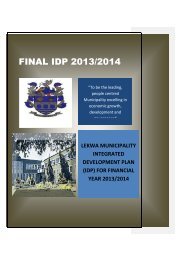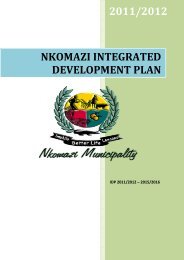Lekwa Local Municipality - Co-operative Governance and ...
Lekwa Local Municipality - Co-operative Governance and ...
Lekwa Local Municipality - Co-operative Governance and ...
Create successful ePaper yourself
Turn your PDF publications into a flip-book with our unique Google optimized e-Paper software.
313 SECTION: 3 NATIONAL AND PROVINCIAL PLANNING FRAMEWORKSAFFECTING LEKWA LOCAL MUNICIPALITY.There are strategies <strong>and</strong> policies that hold the three spheres of local government together. These strategies <strong>and</strong> policies guide<strong>and</strong> provide a framework for integrated service delivery. The <strong>Local</strong> <strong>Municipality</strong> of <strong>Lekwa</strong> has made efforts to align to the keyNational <strong>and</strong> Provincial Strategies;• New Partnership for Africa’s Development (NEPAD)• National Spatial Development Perspective (NSDP)• The Millennium Development Goals (MDG’s)• Provincial Growth <strong>and</strong> Development Strategy (PGDS)• Accelerated Shared Growth Initiative of South Africa (ASGISA)• Integrated Sustainable Development Rural Strategy (ISDRS)• L<strong>and</strong> Redistribution for Agricultural Development (LRAD)• Gert Sib<strong>and</strong>e District <strong>Municipality</strong> Spatial Development Framework3.1 New Partnership for Africa’s Development (NEPAD)The New Partnership for Africa’s Development (NEPAD) is a vision <strong>and</strong> strategic framework for Africa’s Renewal. The NEPADstrategic framework document arises from a m<strong>and</strong>ate given to the five initiating Heads of State (Algeria, Egypt, Nigeria, Senegal,<strong>and</strong> South Africa) by the Organization of African Unity (OAU) to develop an integrated socio-economic development frameworkfor Africa. NEPAD is designed to address the current challenges facing the African continent. Issues such as the escalatingpoverty levels, underdevelopment <strong>and</strong> the continued marginalization of Africa needed a new radical intervention, spearheadedby African leaders, to develop a new vision that would guarantee Africa’s Renewal.The primary objectives of NEPAD are as follows:• To eradicate poverty;• To place African countries, both individually <strong>and</strong> collectively, on a path of sustainable growth <strong>and</strong> development;• To halt the marginalization of Africa in the globalization process <strong>and</strong> enhance its full beneficial integration into theglobal economy; <strong>and</strong>• To accelerated the empowerment of women.The NEPAD priorities are to establish the <strong>Co</strong>nditions for Sustainable Development by ensuring:• Peace <strong>and</strong> security;• Democracy <strong>and</strong> good political, economic <strong>and</strong> corporate governance;• Regional co-operation <strong>and</strong> integration; <strong>and</strong>• Capacity building.Policy reforms <strong>and</strong> increased investment need to take place in the following priority sectors:• Agriculture;• Human development in health, education, science, technology <strong>and</strong> skills development;• Building <strong>and</strong> improving infrastructure, such as ICT, energy, transport, water <strong>and</strong> sanitation;• Promoting diversification of production <strong>and</strong> exports, particularly with respect to agro industries, manufacturing,mining, mineral beneficiation <strong>and</strong> tourism; <strong>and</strong>• Accelerating intra-African trade <strong>and</strong> improving access to markets of developed countries.Key Implications for <strong>Lekwa</strong> <strong>Local</strong> <strong>Municipality</strong>Cross- border municipalities such as Thabo Mofutsanyane District <strong>Municipality</strong> <strong>and</strong> Northern Free State District<strong>Municipality</strong> to the South-South West <strong>and</strong> their LED Strategies should contain practical strategies for feasible twinning projectswith the aforementioned Municipalities.<strong>Municipality</strong>’s LED Strategy should also take into consideration the lessons learnt from the successes <strong>and</strong> failures that havebeen applied in the neighboring municipalities in the face of socio-economic <strong>and</strong> economic challenges.LED projects identified for the <strong>Municipality</strong> by the LED Strategy should embark on eradicating poverty, promoting sustainablegrowth <strong>and</strong> developing <strong>and</strong> facilitating the empowerment of women <strong>and</strong> the poor. The LED Strategy should also promoteagriculture, human development, infrastructure development <strong>and</strong> the diversification of exports.Final Integrated Development Plan (IDP) 2010/2011 for <strong>Lekwa</strong> <strong>Local</strong> <strong>Municipality</strong>


